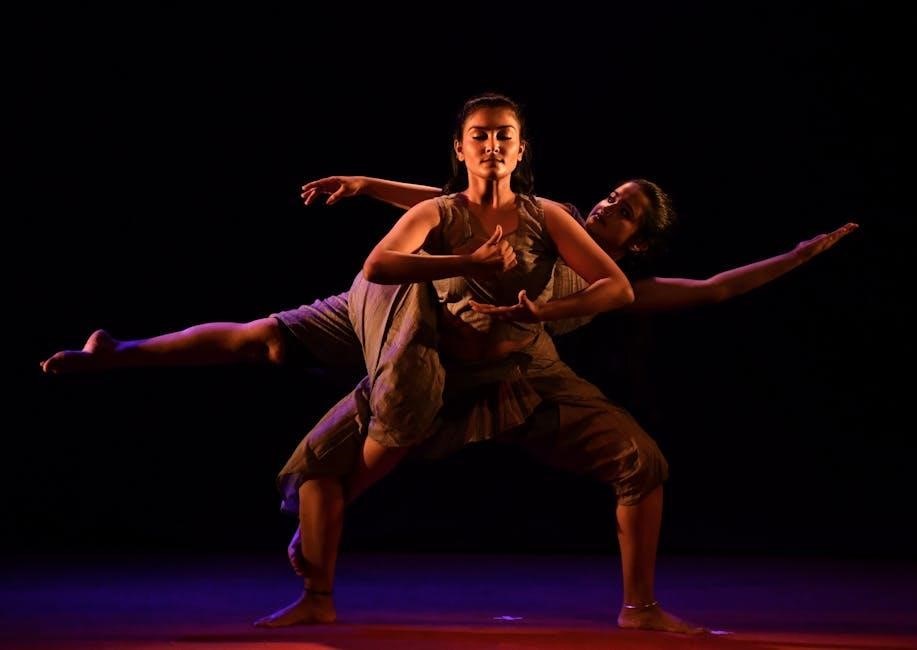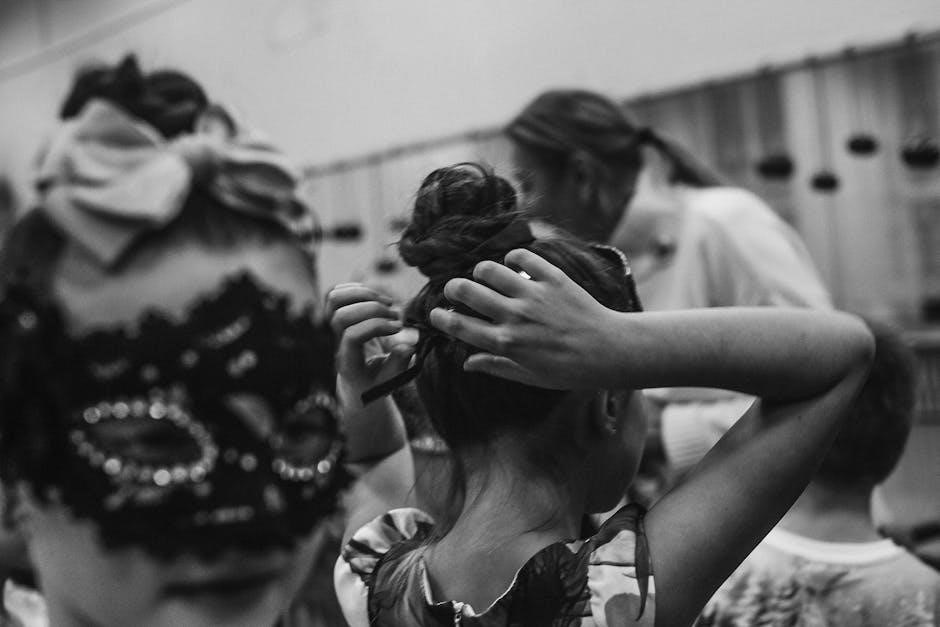Dance Nation, a Pulitzer Prize-nominated play by Clare Barron, explores themes of adolescence, ambition, and societal expectations through a group of young competitive dancers. The play delves into the challenges of growing up and the pressures of competition, offering a raw and emotional portrayal of pre-teen life. With its unique blend of humor and intensity, Dance Nation has gained critical acclaim for its bold storytelling and relatable characters.
Overview of the Play
Clare Barron’s Dance Nation is a dynamic and provocative play that follows a group of young dancers navigating the challenges of adolescence, ambition, and societal expectations. Premiering in 2018, the play blends humor and intensity to explore themes of identity and competition. With a cast of nine female and two male characters, Dance Nation captures the raw energy of pre-teen dancers striving for success in a competitive world. The play has garnered critical acclaim for its bold storytelling and relatable characters, earning it a nomination for the 2019 Pulitzer Prize for Drama. Supported by the Harold and Mimi Steinberg Charitable Trust, Dance Nation offers a powerful commentary on the pressures of growing up and the cutthroat nature of competition, making it a standout work in contemporary theater.
Historical Context and Significance
Debuting in 2018, Clare Barron’s Dance Nation emerged during a time of heightened conversation about youth culture, gender roles, and societal pressures. The play captures the raw intensity of pre-teen dancers navigating adolescence, resonating with audiences amid broader discussions about identity and ambition. Its exploration of competition and self-discovery aligns with the cultural zeitgeist, particularly in the context of shows like Dance Moms, which highlighted the cutthroat nature of youth dance. Nominated for the 2019 Pulitzer Prize, Dance Nation solidified its place in contemporary theater, offering a fresh perspective on the challenges of growing up. Its success underscores the growing interest in stories about young women and their struggles, making it a significant work in modern dramatic literature. The play’s bold storytelling continues to influence theater, sparking conversations about youth, ambition, and societal expectations.
The Plot of “Dance Nation”
Dance Nation follows a group of young competitive dancers, led by the ambitious Amina, as they navigate intense rivalries, personal growth, and the challenges of adolescence, blending humor with youthful intensity.
Setting and Main Characters
The play is set in a competitive dance studio, where a group of young dancers prepares for a major competition. The main characters include Amina, the star dancer; Connie, a talented but overlooked performer; Zuzu, who always feels second best; and Luke, a 13-year-old boy with a crush on Zuzu. These characters, along with their instructor Pat, navigate the pressures of competition, personal ambitions, and their evolving identities. The setting highlights the intense environment of competitive dance, while the characters’ diverse backgrounds and personalities add depth to the story. The dynamic between the dancers and their teacher drives the narrative, exploring themes of rivalry, growth, and self-discovery.
Central Conflict and Themes
The central conflict in Dance Nation revolves around the intense pressures of competition and the struggles of adolescence. The young dancers grapple with their ambitions, identities, and societal expectations, creating a tense and emotionally charged environment. Themes of self-discovery, rivalry, and the challenges of growing up are woven throughout the play. The characters’ desires to stand out and succeed clash with the harsh realities of competition, leading to moments of both triumph and heartbreak. The play also explores how societal expectations shape their perceptions of themselves and their roles in the world. Through their journeys, Barron examines the complexities of youth, ambition, and the search for individuality in a competitive landscape.

Key Themes in “Dance Nation”
Adolescence, identity, competition, and societal pressures are central themes, exploring the challenges of growing up and the intense rivalry among young dancers striving for success and recognition.

Adolescence and Identity
Dance Nation vividly portrays the challenges of adolescence, capturing the raw emotions and struggles of pre-teen girls navigating identity, self-discovery, and societal expectations. The play delves into the complexities of growing up, where characters grapple with body image, personal ambitions, and the pressure to conform. Through their experiences, Barron highlights the tension between individuality and the desire to fit in, as well as the emotional turbulence of this pivotal life stage. The characters’ interactions and conflicts reveal their inner worlds, showcasing their vulnerability and resilience. By exploring these themes, Dance Nation offers a powerful commentary on the struggles of adolescence, making it deeply relatable to audiences of all ages. The play’s portrayal of identity formation is both poignant and humorous, providing a nuanced look at the challenges of young adulthood.
Competition and Ambition
Dance Nation delves into the intense world of competitive dance, where ambition and rivalry drive the characters to push their limits. The play highlights the cutthroat nature of competition, showcasing how the pursuit of victory can both inspire and destroy. Through the dancers’ relentless efforts to outshine one another, Barron examines the fine line between healthy ambition and obsession. The characters’ struggles to balance personal goals with teamwork reveal the emotional toll of constant competition. Ambition, portrayed as both a motivator and a source of conflict, underscores the play’s exploration of human drive and the sacrifices made in pursuit of excellence. By focusing on these themes, Dance Nation provides a compelling look at the highs and lows of competitive environments, resonating with audiences who have ever experienced the pressures of striving for success.
Societal Pressures and Expectations

Dance Nation vividly portrays the weight of societal pressures and expectations on its young characters. The play highlights how external demands, such as the desire to conform to certain standards or achieve perfection, shape their identities and behaviors. The dancers face immense pressure from trainers, parents, and societal norms, which often clash with their personal aspirations. These expectations intensify the emotional struggles of adolescence, as the characters grapple with self-image and acceptance. Barron’s script sheds light on how these pressures can stifle individuality and create tension between personal goals and external demands. Through its raw and unfiltered portrayal, Dance Nation challenges audiences to reflect on the societal forces that shape young lives and the resilience required to navigate them. The play’s exploration of these themes resonates deeply, offering a powerful commentary on modern societal expectations.
The Playwright: Clare Barron
Clare Barron is an acclaimed playwright known for her bold narratives. Her Pulitzer Prize-nominated play features 9 women and 2 men, exploring her unique background and style.
Background and Style
Clare Barron, a rising voice in contemporary theater, crafted Dance Nation with a unique style blending raw emotion and dark humor. Her work often explores themes of adolescence, identity, and societal pressures, resonating deeply with audiences. Barron’s writing is characterized by its boldness and unflinching portrayal of human complexity, making her a standout playwright. Dance Nation, her Pulitzer Prize-nominated play, showcases her ability to weave compelling narratives that challenge and provoke. With a background rooted in storytelling, Barron’s distinctive voice continues to shape modern drama, offering fresh perspectives on universal struggles.
Reception and Critics’ Reviews
Dance Nation has garnered widespread critical acclaim for its bold and unflinching portrayal of adolescence and ambition. Critics praise Clare Barron’s raw, visceral writing and the play’s ability to balance humor with emotional depth. Reviewers highlight its exploration of themes such as identity, competition, and societal expectations, resonating with audiences of all ages. The play’s unique voice and fearless storytelling have been particularly noted, with many calling it a groundbreaking work in contemporary theater. Laura Collins-Hughes of The New York Times described it as “fiercely funny and deeply unsettling,” while other critics have lauded its ability to capture the complexities of growing up. The play’s reception underscores its impact as a powerful commentary on modern life and its challenges.

Production and Performance
Dance Nation premiered in 2018, gaining immediate attention for its bold storytelling and emotional depth. Notable stagings include productions at the Almeida Theatre in London and Steppenwolf Theatre in Chicago. The play’s dynamic performances have captivated audiences, blending raw energy with vulnerability. Its unique blend of humor and intensity has made it a standout in contemporary theater, earning it a Pulitzer Prize nomination and widespread critical acclaim.
Notable Stagings and Adaptations
Dance Nation has been staged at prominent venues like the Almeida Theatre in London and Steppenwolf Theatre in Chicago, receiving widespread acclaim for its bold performances. The play’s dynamic energy and emotional depth have captivated audiences, making it a standout in contemporary theater. A PDF version of the script is available, allowing readers to explore Clare Barron’s vision in detail. Adaptations have maintained the original’s raw intensity, ensuring its themes resonate across different productions. The play’s success has led to its recognition as a finalist for the 2019 Pulitzer Prize, further cementing its place in modern drama.
Awards and Nominations
Dance Nation, Clare Barron’s explosive play, has garnered significant recognition in the theater world. In 2019, it was a finalist for the Pulitzer Prize for Drama, a testament to its groundbreaking storytelling. Additionally, the play won the Susan Smith Blackburn Prize, which honors outstanding works by women playwrights. The Relentless Award also acknowledged Barron’s innovative script, further solidifying its reputation. These accolades highlight the play’s impact and its ability to resonate with diverse audiences. The PDF version of the play, widely available, showcases Barron’s vivid dialogue and the characters’ emotional journeys, making it a must-read for theater enthusiasts and scholars alike. Such recognition underscores Dance Nation’s contribution to contemporary drama, ensuring its place in the spotlight for years to come.
